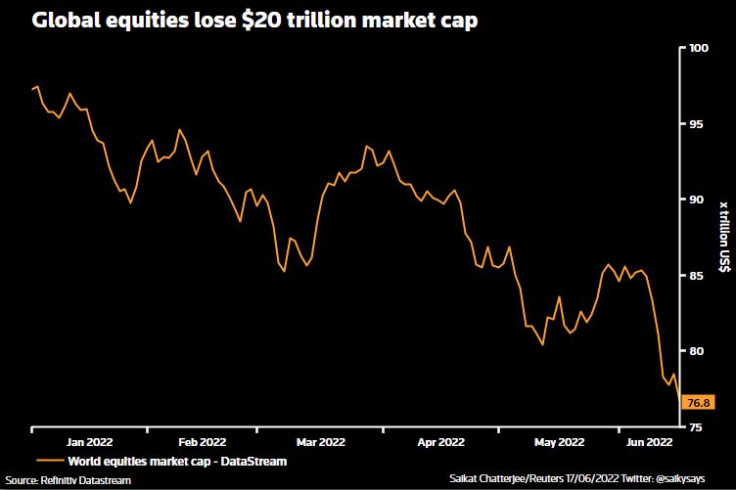Market Positioning Suggests More Pain For Equities Despite Rout - BofA

A market trends indicator by BofA Securities fell to zero for the first time since the pandemic-induced mayhem in financial markets in 2020, signalling extreme bearishness as investors dumped credit and crypto assets.
Though U.S. stocks confirmed a bear market this week that began in January this year and many other stock markets in Europe are already down more than 20% from their highs this year, equity positioning remains heavy, signalling more pain ahead for investors.
In a weekly note on investment flows for various asset classes, the U.S. investment bank said for every $100 of inflows since January 2020, there had been $35 of outflows from debt with zero from stocks, indicating more pain ahead for equities.
"Capitulation has been in credit and crypto, not stocks," BofA Securities analysts led by Michael Hartnett said in a note. "This is why we worry equity lows (are) not yet in."
Various technical indicators in the stock market are already suggesting deeper losses may be ahead.
A gauge of U.S. equities encompassing overseas listed shares, bond ETFs and domestic stocks is at a 200-week moving average, according to the U.S. investment bank, a close below which would see it drop to four-year lows.
Elsewhere, the high flying Nasdaq composite index is trading near the 200-week moving average, levels it hasn't traded below since the global financial crisis in 2008, according to Refinitiv data.
World stocks have endured one of the most tumultuous weeks in financial history thanks to aggressive central bank tightening to curb inflation. MSCI's benchmark is down 5.7% for the week so far, on course for the steepest weekly percentage drop in more than two years.
World stocks have lost $20 trillion in market capitalisation this year.
Bitcoin, the world's biggest and best-known cryptocurrency, has lost more than half its value from this year's high of $48,234 on March 28 and was languishing around the $21,000 level.
At a broader asset class level, equity funds attracted $16.6 billion while bond funds saw the biggest outflows since April 2020 at $18.5 billion in the week to Wednesday, according to BofA's analysis of EPFR data.
In equities, U.S. equity funds saw inflows for past six weeks, while Japan saw outflows for the past four weeks. Europe saw outflows for the past 18 weeks.
GRAPHIC: Global stocks (

)
© Copyright Thomson Reuters 2024. All rights reserved.




















